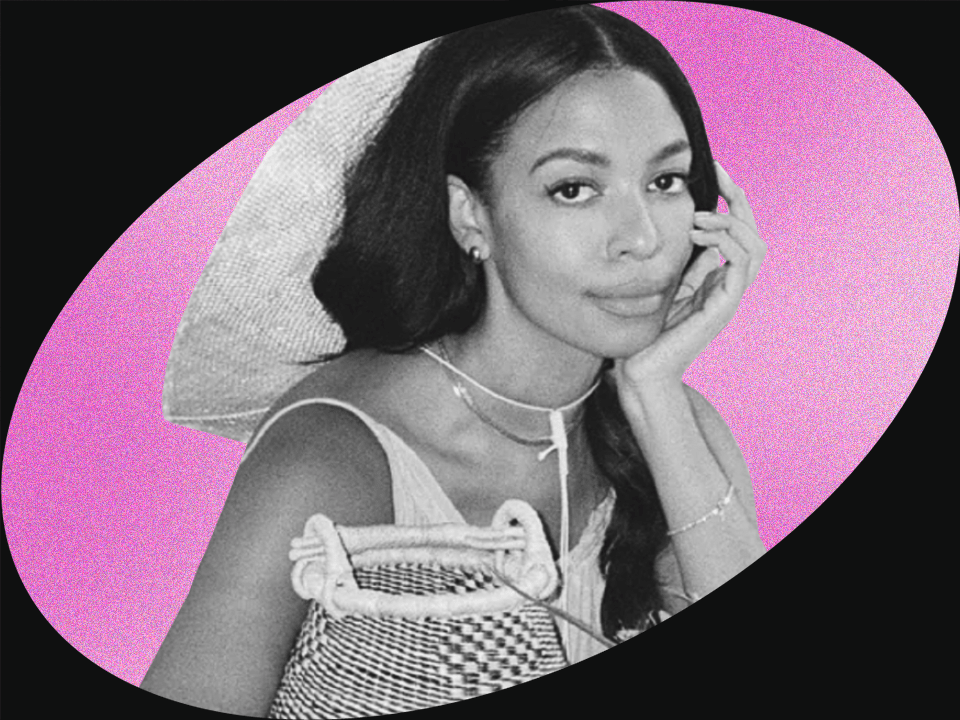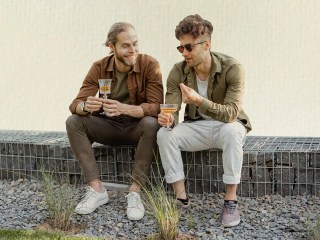Aurora James Opens Up About This Lifelong Mental Health Struggle
The Fifteen Percent Pledge founder talks body image, eating disorders, and creating something beautiful.
If you keep up with the fashion biz, you already know the name Aurora James and the impact she’s had on businesses across America. If you don’t, it’s time to get familiar with the brains behind Brother Vellies, her fashion label that’s responsible for some of the most memorable Met Gala looks, like the headline-making “Tax The Rich” gown that Alexandria Ocasio-Cortez wore in 2021.
James also shines as the founder of the Fifteen Percent Pledge, which pushes brands to commit to supporting Black-owned businesses and Black employees in an effort to make their companies more representative of the country we live in. “I think there's so much magic that can happen when you give deserving people an opportunity to be great,” she tells Wondermind.
Last month she also added “author” to her impressive resume when she published her memoir, Wildflower, which takes readers through her adolescence to infusing $10 billion into Black-owned companies with her nonprofit and becoming the first Black American female designer to take home a prestigious CFDA Award.
While it might seem like success after success, James is also incredibly candid about the hurdles in her journey, being an open book when it comes to her mental health, her stormy adolescence, and how her job impacts her mindset and body image today. Here, James talks about some of the lessons on love, confidence, and failure that she’s picked up along the way.
[Sign up here to never miss these candid conversations delivered straight to your inbox.]
WM: How are you doing lately?
Aurora James: To be honest with you, I'm tired, and my Oura Ring [that tracks my sleep] is confirming that I should be tired. I think it's everything [contributing to the feeling]. I launched the Fifteen Percent Pledge nonprofit three years ago, and I've had my business Brother Vellies for almost 10 years, so I think it's just a lot of work. And then I think of the level of vulnerability that I put onto the pages with this book is also a thing that is a little bit heavy for me. So I think all of those things, plus travel, is a heavy weight.
WM: You recently said you work pretty much all the time. Do you see a break in sight?
AJ: It has to be a relay. That's how I think of it. And sometimes it's your time to take the baton and really carry the weight. I tell this story in my book that I fell in love with in 2020 about geese, which I didn't really know that much about, but they fly in that V formation that we've all seen. And you think about maybe the last time you saw a group of geese flying overhead, and you hear the quacking. The quacking is the birds at the back of the V that are cheering on the birds at the front of the V, and they fly in that V so that the ones in the back can have a lighter load because they're kind of on the wind of the ones in the front. Right now, I feel like I'm just going through that rotation. … In a different chapter, I'll be able to fall further back in the V and pick up some of the wind from those that are flapping their wings further in front of me, and then it will be my turn to cheer them on.
WM: Your book dives into your upbringing and your career before founding your nonprofit, and you write a bit about your body image journey. Do you mind sharing what your relationship with your body was like when you were younger and what it's like today?
AJ: It was so hard, I have to say. I think especially as a woman of color, and I was born in 1984, so all through the '90s and even early 2000s, you're just bombarded with [unrealistic] images in the fashion industry. … It's challenging when the world tells you that you need to shrink, not just emotionally and intellectually, but also physically.
I also think as someone who sees so much going on in the world, I struggle with climate anxiety. I struggle with racial anxiety. I struggle with all of these different types of anxiety. It's really easy for me to use my eating disorder as a crutch to gain some kind of control. That's a lifelong thing that you have to work on. For me, I think every few years I'll get triggered because of whatever will happen in my own life, and I have to take it one day at a time and really think and feel through what's going on with me that’s causing me to have these feelings and want to treat myself that way.
WM: As someone who works in the fashion industry, which often glamorizes unattainable body standards, does that ever mess with your mind?
AJ: It's definitely tough. I think it's come a long way, but I struggle a lot in the book with the idea of modeling in general because you're kind of taking one group of women and weaponizing them against another group of women in order to sell products, which is a nightmare and not a place that I want to be selling products from at all.
There's so much pressure [on women]. Even last year, I was with one of my best friends who's a male designer named Brandon Maxwell, and I'm like, “What are you wearing to the event?” And he's like, “The Tom Ford tux that I always wear.” And I was like, “That must be nice.” Women have this outside pressure to show up every day looking different, wearing a thing. You get all these emails that are like, “This is what you should wear on date night. This is what you need to wear this spring in order to be relevant at all.” Throw that all in the trash.
But I would be lying if I say that it didn't affect me. It somehow seeps into my subconscious sometimes too. … I never really struggled with drugs. I never even really struggled with drinking or anything like that. I think that’s the thing that I struggled with, and I think it will be a lifelong struggle.
WM: What's something that you're most proud of in your mental health journey?
AJ: I think when I wake up every day, I still open my eyes and feel wonder about the world and all the potential that's there. I think I still get really energized around the possibility of positive change and growth. I think I look at broken systems and I'm like, Oh my god, what if we fix this? Imagine how great it would be. I still get joy from that.
There's a part in the book where I talk about making these seed bombs—seeds put in clay and dirt, and they’re round—with my mom. And when we would go on road trips, we would look for these abandoned, ugly lots, just random places, and then we would throw these seed bombs into the grass that's there or dirt that's there. And we would just know that a few weeks later there would be wildflowers blossoming everywhere. I think her doing that practice with me and setting that intention to make something in order to bring life to a space that people have not been caring about or being dismissive of and turning it into something really beautiful has really stuck with me.
WM: That's so admirable, especially when you’re doing really challenging work on a regular basis.
AJ: But also, by the way, sometimes I'm like, “Let's just throw this one in the trash.” You know what I mean? That's also part of the mental health journey to be like, “Oh, actually, this one? I'm not fixing this one. We're just going to throw it out.” Because you can't take on everything. Sometimes you got to know when to just say no—that's just as important as saying yes.
WM: What’s something you've recently let go of that has changed how you move through the world?
AJ: I'm toying with letting go of the idea of what kind of family I might want for myself. Sometimes you have to play your own devil's advocate and challenge your own ideas about what you think you want in order to decide if you do want that or if you don't want that, right? But you have to be willing to explore all of these ideas that you have about yourself and these ideas and images you create of the future.
So often we create these images of the future for ourselves, and we fall so in love with these ideas of the future that we don't even know if we really want that thing anymore. That happens so often, especially in relationships. It's like, you can't break up with that person because you have this idea of what you guys are going to do at the holidays and it's going to be so fun, or you just picture all these things, but it's like, that's not real. You have to be happy right now. With everything that I'm trying to “work towards,” I need to make sure that that's actually a thing that I feel like I want. More so than going towards any goal, what I actually need to do most is make sure that every day I feel good about how I'm living my life and I'm not just trying to orchestrate some future version of my life.
The ability for all of us to make a pivot is critical. And you can't call yourself a failure for jumping off something that's not working. The failure is when you stay in the thing that's not working. There was this whole thing with my mom after she left this relationship with my stepfather, which was an absolute train wreck, and I said, “Why didn't you leave earlier?” And she was like, “Well, because I didn't want to come back a failure.” And it's like, “No, the failure was to stay.” You know what I mean? We really have to challenge ourselves on what it means to fail and what it means to win and be successful because oftentimes, we get stuck in these systems and structures and relationships and jobs and companies because we're so sure of what this idea means to be successful that's dead wrong.
This interview has been edited and condensed for length and clarity.
Wondermind does not provide medical advice, diagnosis, or treatment. Any information published on this website or by this brand is not intended as a replacement for medical advice. Always consult a qualified health or mental health professional with any questions or concerns about your mental health.




